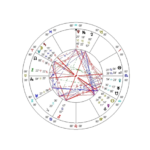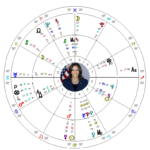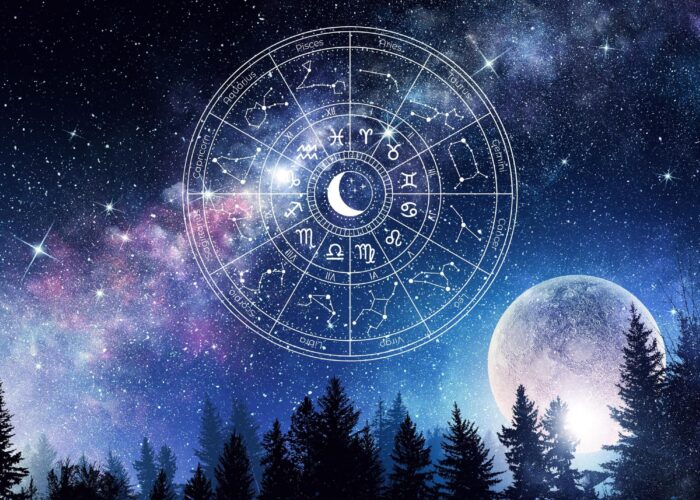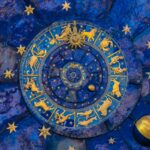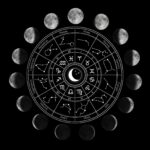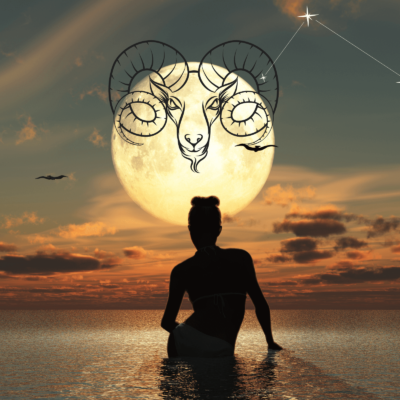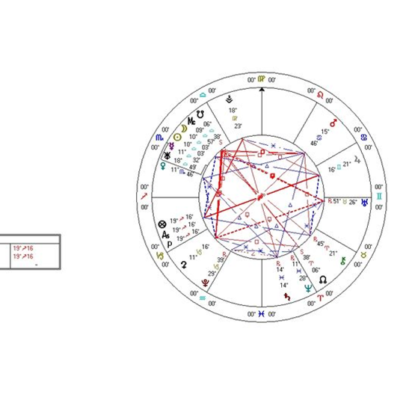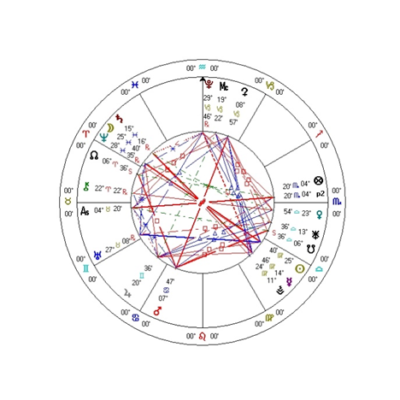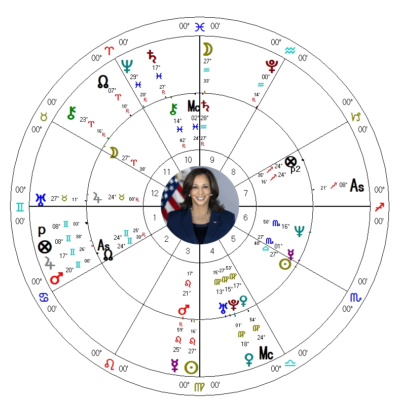In astrology, the Moon is one of two celestial luminaries (the other being the Sun) that is profoundly significant in one’s life, influencing our emotions, physical body, and relationship to home and mother. The Moon’s omnipresent glow adorns the night sky, and its waxing and waning energies are deeply felt, providing much insight into a native’s personality and energies. In ancient myths, the Moon was Luna or Selene, the Goddess of fertility, nurturing, and physical growth.
The Moon is one of “The Big Three” in astrological discourse. The other two are the Sun and The Rising Sign. The Moon is important in everyone’s chart and even more important than the Sun in the chart of one born at night. In this article, I will explore the symbolism of the Moon in each zodiac sign. In another article (Moon in Astrology: Exploring its Moods in the 12 Houses of the Zodiac), I discussed aspects of the Moon relative to house placement and other aspects. The house placement and aspects from other planets will always color and inform the meaning of the Moon in one’s chart. In some charts, the Moon will be stronger in expression than others. In some charts, the Moon will be muted in expression.
Moon in Astrology: Table of Contents
THE MOON: SYMBOLISM AND SIGNIFICANCE
The Moon, the luminary that reflects the Sun’s radiant light upon Earth, embodies the essence of nurturing, emotional depth, childhood attitudes, relationship to mother, physical body, and how we process childhood experiences. Symbolically, it encapsulates the essence of one’s emotional landscape, representing the subconscious mind and instinctual responses. It is always there, visibly reminding us, as we gaze up into the night sky, of the cyclical nature of life, drawing parallels to the waxing and waning phases akin to the ever-changing rhythms of our existence.
The Moon reminds us: “For everything there is a season and a time for every matter under heaven”—Ecclesiastes.
Lunar Archetypes and Mythological Origins
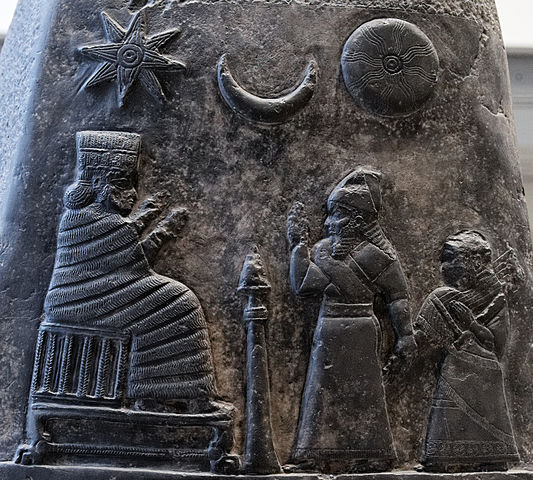
Across diverse cultures, the Moon reverberated with profound mythological resonance. It was there waxing from darkness to a crescent to a full moon to a waning crescent. The ancient people looked at the luminous Moon and, very early on, could accurately predict Eclipse cycles. The Moon loomed large in everyday life in a world devoid of televisions, cell phones, automobiles, etc.
In ancient Babylonian lore, the Moon was entwined with Sin, the time-measuring deity. The Greco-Roman pantheon heralded the Moon as Selene, the luminous Goddess overseeing the slumber of mortals. Artemis and Diana, embodiments of virginity and childbirth, were hailed as the celestial huntresses of the new Moon. She had many faces and attributes.
The Moon’s myriad associations extended to feminine archetypes, embodying the nurturing aspects of motherhood, fertility, and domesticity. It invoked reverence as the guardian of childbirth and women’s roles, illuminating the interconnected tapestry of life’s facets.
Moon in Astrology
In astrology, the Moon governs various domains, including emotions, instincts, habits, and receptivity. It symbolizes the maternal figure, reflecting upon one’s relationship with the mother and familial nurturing. Furthermore, the Moon intertwines with the rhythms of our daily life, unconsciously influencing habits, routines, and intuitive inclinations.
Also, astrologically, the Moon delves into the intricacies of the psychological realm, revealing profound insights into one’s emotional landscape. Its positioning in a birth chart unveils emotional response patterns, nurturing instincts, and inherent vulnerabilities. Lunar transits, especially from outer planets, evoke profound mood shifts, fostering periods of introspection or heightened sensitivity,
MOON IN ZODIAC SIGNS
Delving into the Moon’s placement within the Zodiac signs unveils a rich tapestry of emotional inclinations, instinctual patterns, and nuanced influences that shape an individual’s inner landscape. Each zodiac sign imbues the Moon with distinctive flavors, as outlined in the part below, uniquely coloring emotional responses and nurturing tendencies. However, this should be considered a general overview, as other factors in the individual horoscope will support or restrict the Moon’s position and influence. Also, various tones and influences depend on the exact degree of one’s Moon, and a study of which house the Moon rules will help define emotional areas of interest.
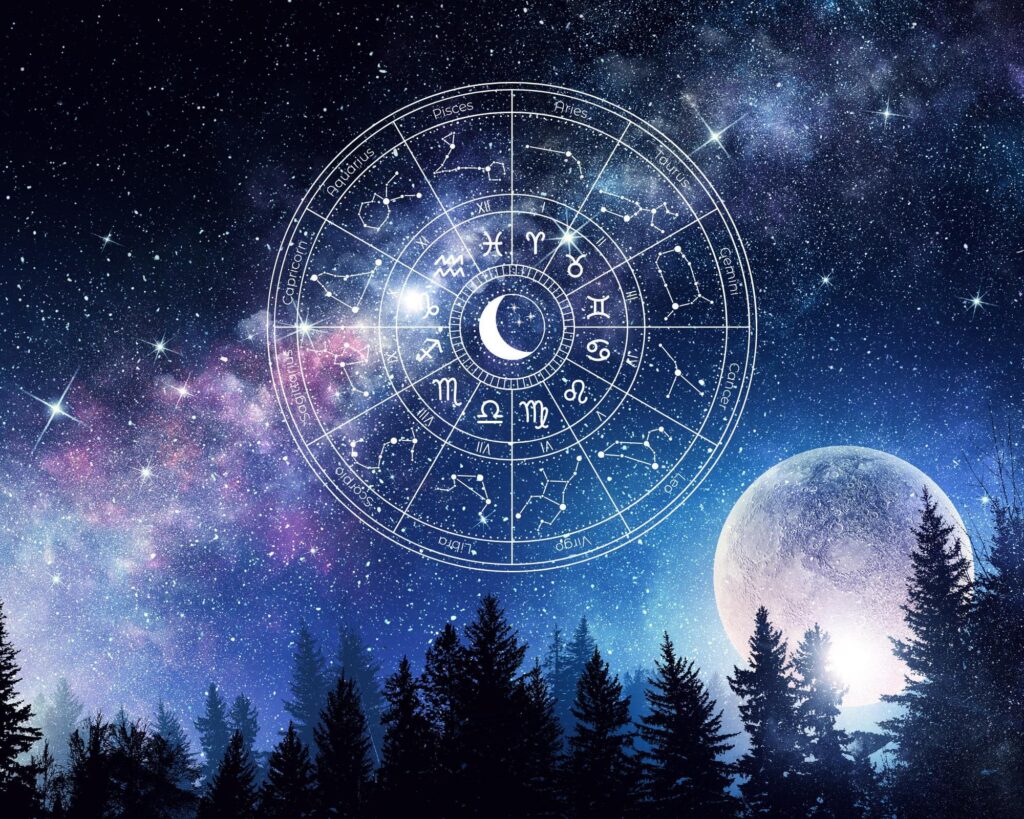
Aries (Moon in Aries)
The Moon in Cardinal Fire Aries describes a person with ardent passions. Emotions are vibrant, often expressed forthrightly, with no promise of forever. An Aries Moon person loves conquest and capturing one’s heart. Quick emotional shifts mirror the Aries’ penchant for immediacy, leading to assertiveness in nurturing tendencies.
Taurus (Moon in Taurus)
With the Moon nestled in Fixed Earth Taurus, stability and sensuality are the emotional tone. Emotional comfort is partly dependent on material security, and here, the Moon as nurturer is steadfast and patient in their approach. A strong connection to nature and a penchant for creature comforts define this lunar placement. The Moon is Exalted (very happy and functional) in Taurus.
Gemini (Moon in Gemini)
The Moon in Mutable Airy Gemini person is talkative and versatile with an active intellectual curiosity. Emotions are not always “felt”. There may be an inclination towards chattiness and engaging in “self-talk” to understand their feelings. The Gemini Lunar type may be nervous about emotional expression. With Good Aspects to this Moon position, they may be very practical in their home.
Cancer (Moon in Cancer)
The Moon rules the Cardinal Water sign Cancer, and this is where emotions run deep, fostering a nurturing instinct akin to the protective embrace of the mother archetype. Sensitivity, empathy, and an innate connection to familial roots define this placement. Moon in Cancer folks are concerned with security and naturally very sensitive to the needs of others.
Leo (Moon in Leo)
In Leo, a Fixed Fire sign, the Moon suggests a subconscious need to be admired and appreciated. Emotions are grand and expressive, and Leo Moon signs yearn for recognition. A need for creative outlets and emotional validation characterizes this lunar placement, infusing nurturing tendencies with dramatic flair. Leo Moon people may wish to act out their feelings. Strong need to love and be loved.
Virgo (Moon in Virgo)
Precision and practicality color the emotional landscape with the Moon in Mutable Earth Virgo. Nurturing inclinations are methodical, focused on service, and grounded in detail-oriented approaches. Emotional fulfillment stems from order, structure, and acts of assistance. They may be shy or nervous about expressing themselves emotionally.
Libra (Moon in Libra)
Harmony and balance shape the Moon’s expression in the Cardinal Air sign Libra. Emotional responses seek equilibrium, and they need and thrive in partnerships. A strong desire for fairness and aesthetic beauty influences nurturing tendencies, emphasizing harmony in relationships. The Moon in Libra people may wish for you to take the lead, as this sign often will not have a strong opinion.
Scorpio (Moon in Scorpio)
Intensely passionate and often possessive, the Moon in Scorpio is in its Fall. The Scorpio Moon person craves profound emotional depths. The Moon in this Fixed Watery sign can cause the native to hold on to unhealthy emotions, especially anger and jealousy. “Letting go” can be cathartic for the Scorpio Moon person.
Sagittarius (Moon in Sagittarius)
The Moon in Sagittarius person may be intensely idealistic concerning their emotions. The Moon in a Mutable Fire sign signifies a person who fears boredom and whose emotional fulfillment is often found through adventure, learning, and personal freedom. Nurturing tendencies encourage an open-minded approach. They are naturally optimistic. They may seem aloof and far away emotionally to others.
Capricorn (Moon in Capricorn)
The Moon in Cardinal Earth Capricorn is in the sign of its Detriment, which is always the case when a planet or luminary is in the sign opposite one it rules. The Capricorn Moon has a difficult time warming up emotionally. Emotions are controlled and channeled toward ambitions and goals. A need for respect and recognition shapes the emotional landscape. Some Moon in Capricorn people are attracted to older partners. Nurturing tendencies suggest imposing structures for life lessons.
Aquarius (Moon in Aquarius)
Innovative and unconventional, the Moon in Fixed Air Aquarius thrives on individuality and humanitarian causes. Emotional fulfillment stems from uniqueness and progressive ideals. Their understanding of their partner is a rational synthesis, as feelings are not natural. Nurturing tendencies emphasize freedom of expression and collective well-being.
Pisces (Moon in Pisces)
The Moon in Pisces, a Mutable Water sign, evokes dreamy, empathetic, and deeply intuitive emotional responses. Nurturing inclinations are compassionate and often intertwined with artistic or spiritual endeavors. Sensitivity and escapism may characterize this placement.
MOON IN ASTROLOGY: WHY IS THE MOON MORE POTENT FOR SOME AND NOT FOR OTHERS?
It is important to be aware that a brief description of the Moon in the zodiac signs is not enough to understand the Lunar placement in one’s chart without considering house placements, the moon phase, and aspects that strengthen or diminish lunar energy. A person born at night may be more lunar than one born during the day. A person born at the New Moon may not feel as in tune with their Moon as they do with the solar energy. There are so many variables that can come into play. In my next article, I will discuss the Moon in the houses so one can get more information on the subtle variations and tones of the Moon.
Factors Influencing the Moon’s Strength
Essential Dignities
The Moon’s strength is deeply intertwined with its essential dignities, encompassing exaltation, rulership, detriment, and fall within specific zodiacal signs. An exalted or domiciled Moon resonates with heightened potency, fostering robust emotional expression and nurturing capacities. Conversely, a Moon in detriment or fall may struggle to manifest its qualities freely, impacting its perceived strength.
Aspects and Configurations
The Moon’s strength is also influenced by its relationships with other celestial bodies through aspects. Harmonious aspects, such as trines or sextiles, may bolster the Moon’s expression, enhancing emotional depth and nurturing abilities. On the contrary, challenging aspects, like squares or oppositions, especially from Mars or Saturn, might present hurdles, diluting the Moon’s strength and causing fluctuations in emotional stability.
Sect and Phase
The concept of sect, based on the chart’s diurnal or nocturnal nature, is pivotal in determining lunar strength. A nocturnal chart, where the Moon is above the horizon at night, accentuates its influence, amplifying emotional sensitivity and nurturing tendencies. Additionally, the Moon’s phase at birth, whether waxing or waning, infuses nuances into its strength, with a waxing Moon often considered more potent in initiating endeavors.
Contextual Analysis
The strength of the Moon is also contextual, considering its placement in specific houses and its relationship with the chart’s angles, emphasizing its prominence or subtlety in influencing the individual’s life. For instance, a Moon closely aligned with the Ascendant or Midheaven may amplify its influence, indicating a stronger presence in one’s persona or public life.
Individual Variations
Personal Evolution and Growth
The strength of the Moon in an individual’s chart might evolve over time, influenced by experiences, personal growth, and conscious development. As individuals navigate life’s journey, their emotional landscape and nurturing capabilities evolve, altering the perceived strength of the Moon in their charts.
Other Dominant Planetary Influences
The prominence of other celestial bodies within the chart, especially the Sun and the outer planets, might overshadow the Moon’s influence, affecting its perceived strength. Dominant planetary configurations may shift the focus away from lunar qualities, reducing the apparent strength of the Moon.


